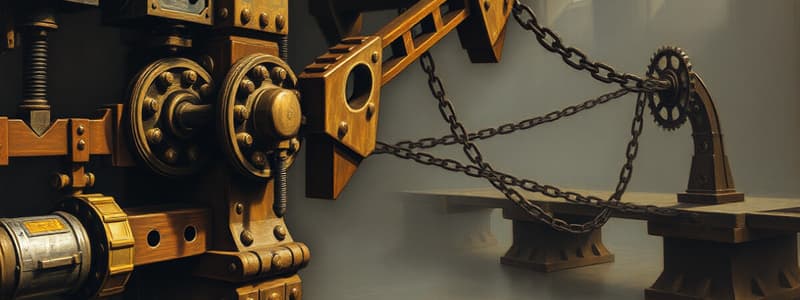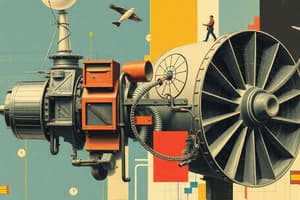Podcast
Questions and Answers
What is the primary role of a linkage in a mechanism?
What is the primary role of a linkage in a mechanism?
- To change the shape of components
- To transfer motion and force between different parts (correct)
- To reduce the weight of a system
- To store energy for later use
In what way do open-loop systems differ from closed-loop systems?
In what way do open-loop systems differ from closed-loop systems?
- Closed-loop systems do not require any input
- Open-loop systems operate without feedback (correct)
- Closed-loop systems are always mechanical
- Open-loop systems generate feedback responses
What does Hooke's Law describe?
What does Hooke's Law describe?
- The efficiency of a mechanical lever
- The relationship between weight and mass
- The force a spring exerts based on its extension (correct)
- The energy loss due to friction in mechanisms
How is the moment calculated when a force is applied at a distance from a pivot?
How is the moment calculated when a force is applied at a distance from a pivot?
What is a bevel gear typically used for in mechanical systems?
What is a bevel gear typically used for in mechanical systems?
Which statement about friction in mechanisms is accurate?
Which statement about friction in mechanisms is accurate?
What is the primary disadvantage of a closed-loop system compared to an open-loop system?
What is the primary disadvantage of a closed-loop system compared to an open-loop system?
How is the efficiency of a belt drive system impacted by slippage?
How is the efficiency of a belt drive system impacted by slippage?
Which formula represents Hooke's Law?
Which formula represents Hooke's Law?
What does the mechanical advantage of a lever indicate?
What does the mechanical advantage of a lever indicate?
Flashcards are hidden until you start studying
Study Notes
Mechanisms and Motion Transfer
- Linkages in mechanisms transfer motion and force between different parts, ensuring synchronized operation.
- Belt drives are essential for transferring rotational motion and power from one shaft to another, facilitating smooth operation.
System Types
- Open-loop systems operate without feedback, making them simpler but potentially less accurate.
- Closed-loop systems incorporate feedback, enhancing precision and allowing for adjustments based on output.
Mechanical Advantage
- The mechanical advantage of a lever is calculated using the formula: Mechanical Advantage = Load / Effort, indicating how much load can be lifted relative to the input effort.
Hooke's Law and Springs
- Hooke's Law states that the force exerted by a spring (F) is directly proportional to its extension (x), expressed as F = kx, where k is the spring constant.
Gears and Rotational Direction
- Bevel gears change the direction of shaft rotation and are often found in applications like differential drives in vehicles, facilitating smooth cornering.
Friction in Mechanisms
- Friction can be beneficial by preventing slippage and increasing grip in mechanical systems, but it also poses drawbacks such as wear and energy loss.
Moments and Torque
- The moment (torque) generated by a force can be calculated by multiplying the force applied with its distance from the pivot, such as a 10N force applied 0.5m from the pivot yielding a 5Nm moment.
Efficiency Considerations
- Slippage in belt drive systems adversely affects efficiency by reducing the effective power transfer between shafts, leading to performance losses.
Mass vs. Weight
- Mass refers to the quantity of matter in an object, while weight is the gravitational force acting on that mass, which varies depending on the gravitational field strength.
Mechanisms and Motion Transfer
- Linkages in mechanisms transfer motion and force between different parts, ensuring synchronized operation.
- Belt drives are essential for transferring rotational motion and power from one shaft to another, facilitating smooth operation.
System Types
- Open-loop systems operate without feedback, making them simpler but potentially less accurate.
- Closed-loop systems incorporate feedback, enhancing precision and allowing for adjustments based on output.
Mechanical Advantage
- The mechanical advantage of a lever is calculated using the formula: Mechanical Advantage = Load / Effort, indicating how much load can be lifted relative to the input effort.
Hooke's Law and Springs
- Hooke's Law states that the force exerted by a spring (F) is directly proportional to its extension (x), expressed as F = kx, where k is the spring constant.
Gears and Rotational Direction
- Bevel gears change the direction of shaft rotation and are often found in applications like differential drives in vehicles, facilitating smooth cornering.
Friction in Mechanisms
- Friction can be beneficial by preventing slippage and increasing grip in mechanical systems, but it also poses drawbacks such as wear and energy loss.
Moments and Torque
- The moment (torque) generated by a force can be calculated by multiplying the force applied with its distance from the pivot, such as a 10N force applied 0.5m from the pivot yielding a 5Nm moment.
Efficiency Considerations
- Slippage in belt drive systems adversely affects efficiency by reducing the effective power transfer between shafts, leading to performance losses.
Mass vs. Weight
- Mass refers to the quantity of matter in an object, while weight is the gravitational force acting on that mass, which varies depending on the gravitational field strength.
Studying That Suits You
Use AI to generate personalized quizzes and flashcards to suit your learning preferences.




